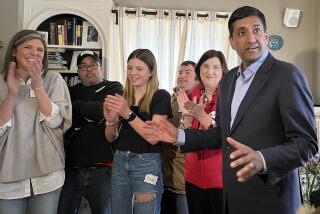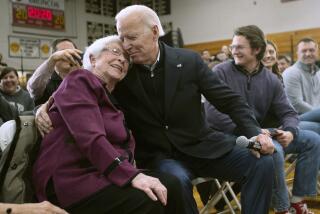Buchanan Starts ‘America First’ Bid for President
- Share via
CONCORD, N.H. — Calling for a “new nationalism” based on the principle of “America first” to safeguard U.S. interests in the post-Cold War world, conservative commentator Patrick J. Buchanan on Tuesday launched his campaign to challenge President Bush for the 1992 Republican nomination.
With the Cold War won, “We Americans . . . must begin to prepare for the new struggles already under way,” Buchanan told supporters in New Hampshire’s capital city. The Feb. 18 primary in this economically depressed state will be a critical test for Buchanan’s admittedly long-shot candidacy.
In place of the menace of communist aggression that for so long inspired the conservative movement, Buchanan sounded the alarm against “the rising economic power of the Japanese” and the burgeoning strength of the European Community. “The 20th Century was the American Century,” he said, “but they intend to make the 21st the Century of Europe and the Century of Asia.”
He proposed “a new patriotism, where Americans begin to put the needs of Americans first,” coupled with a “a new nationalism, where in every negotiation, be it arms control or trade, the American side seeks advantage and victory for the United States.”
Buchanan also called for phasing out foreign aid and decried the continuation of policies under which, he said, the United States carries “the burden of defending rich and prosperous allies who take America’s generosity for granted as they invade our markets.”
In a 15-minute speech devoted mainly to threats from abroad, Buchanan dealt only briefly with the domestic roots of the nation’s problems. He charged that the programs of President Lyndon B. Johnson’s Great Society, in addition to burdening the taxpayer, had produced “a social catastrophe.”
“The welfare state has bred a generation of children and youth with no fathers, no faith and no dreams--other than the lure of the streets,” he said.
Buchanan’s announcement came less than a week after former Ku Klux Klan leader David Duke announced his intention to challenge Bush in primaries around the country, with the exception of the New Hampshire contest. But political analysts believe that Duke’s main threat to Bush would come in the general election, if he makes good on his threat to run as a third-party candidate.
Buchanan, on the other hand, is seen as potentially causing serious problems for Bush in the primary campaign by getting a protest vote large enough to embarrass the President. The analysts cite Buchanan’s service as an aide to two Republican presidents--Richard M. Nixon and Ronald Reagan--and his longtime links to the conservative moment as giving him a base of support upon which to build.
Buchanan, who never before has run for office, said Tuesday that Bush “is a man of graciousness, honor and integrity who has given half a lifetime to his nation’s service. But the differences between us are now too deep. He is yesterday and we are tomorrow. He is a globalist and we are nationalists. He would put America’s wealth and power at the service of some vague New World Order; we will put America first.”
In comments to reporters in nearby Manchester on the eve of his announcement, Buchanan conceded the difficulty of taking on an incumbent President.
Reflecting on past challenges, he said that, if a President “uses his resources and fights in every state, it is almost impossible” to prevent an incumbent’s renomination. “If you want to bet, you ought to bet on George Bush to win the nomination and the election,” he said.
Buchanan’s own resources are slim. He said he put up $50,000 of his own money to finance a direct-mail fund-raising campaign. Lacking the finances to pay for high-powered television advertising, he plans to rely heavily on “free media”--television interviews in Washington, Boston and New Hampshire itself to get his message across.
His post-New Hampshire strategy is still uncertain. His sister, Angela M. (Bay) Buchanan, the former U.S. treasurer and unsuccessful candidate for California treasurer who is chairing her brother’s campaign, cited a number of early primary states in which Buchanan may contest Bush. They include South Dakota, Maryland and North and South Carolina.
New Hampshire GOP Chairman Rhona Charbonneau was skeptical about Buchanan’s prospects. “Some people think he can hurt the President, but I don’t think he’s going to pull that kind of a vote,” she said in an interview.
Charbonneau guessed that Buchanan would receive no more than 15% to 20% of the primary vote. Despite the state’s hard economic times, she said, “people still have faith in the President.”
But Buchanan sees the chance that he could emerge from the New Hampshire primary, if not as a conquering hero, then as a spoiler who might force Bush to abandon his hopes for renomination.
“There is a possibility, as we saw in 1952 and 1968, that . . . an incumbent President can be convinced that the country is changing dramatically to some new idea, where he represents the old,” he said. He was referring to the New Hampshire primary successes of Tennessee Sen. Estes Kefauver, which helped persuade incumbent Harry S. Truman not to seek another term, and of Wisconsin Sen. Eugene J. McCarthy, which had the same effect on Johnson.
But to carry this off, Buchanan acknowledged, “You’re going to have to make the case here in New Hampshire that we represent the future, so that then the President would have to say: ‘Even though I might win the nomination, it’s not worth it.’ ”
In addition to his talents as a tough political tactician and aggressive advocate of conservative views, Buchanan could benefit from New Hampshire’s hard economic times, which polls show has fostered discontent with the GOP regime in Washington.
A survey last month by the New Hampshire Poll, an independent firm that services businesses and the media, found that Bush’s job approval rating in the state had fallen to 49%, down from 76% last March in the halcyon days of the U.S. victory in the Persian Gulf War. Nearly two-thirds of registered voters said they do not believe that they are better off than they were four years ago, and registered Republicans preferred Bush to Buchanan by a margin of only 44% to 24%, with 32% undecided.
Buchanan made clear in his speech that he is prepared to exploit this opportunity. Criticizing Bush for breaking his promise not to impose new taxes and for failing to keep federal spending in check, he said: “And what is the White House answer to the recession caused by its own breach of faith? It is to deny we even have a recession. Well, let them come to New Hampshire.”
In talking to reporters earlier, Buchanan said he would say to New Hampshire voters: “Look, you gave Mr. Bush your confidence. Did he keep it? Did he keep his promises? And here’s what I would do, and you’ll have to choose between Mr. Bush and me.”
What Buchanan would do as President, he said, would be to go to the Congress with a program of tax cuts--in capital gains, social security withholding and middle-class income tax rates--intended to restore confidence in presidential leadership.
“Vote it up or down,” Buchanan said he would tell the Democrat-controlled House and Senate. “If you vote it up, I’m responsible for the economy. If you vote it down, then you guys are responsible for continuing the recession you hope to ride right into the White House.”
For all his associations with the conservative movement, Buchanan’s backing on the right is far from unanimous, in large part because many conservatives criticize his America first theme as isolationist and protectionist.
But Buchanan dismisses such criticism. “I want to know why, when the Red Army is out of East Germany and East Berlin, Poland Czechoslovakia, Hungary and the Ukraine, why we need 250,000 guys with M-16 rifles in Bavaria, how long will they be there, why can’t the West Germans take over responsibility,” he told reporters.
Profile: Patrick J. Buchanan
Born: Nov. 2, 1938
Hometown: Washington, D.C.
Education: Bachelor’s degree, Georgetown University, 1961. Master’s degree, Columbia University School of Journalism, 1962
Career highlights: Editorial writer, St. Louis Globe-Democrat, 1962-1964, then assistant editorial editor, 1964-1965; executive assistant to Richard M. Nixon at his law firm, then White House special assistant and speech writer 1969-1972, special consultant, 1972, a post he held through the first few months of Gerald R. Ford’s term in 1974. Columnist, radio and television commentator and panelist, beginning in 1975; director of communications, Ronald Reagan White House, 1985-1987
Personal: Married May 8, 1971, to Shelley Ann Scarney, then a White House receptionist; no children
More to Read
Get the L.A. Times Politics newsletter
Deeply reported insights into legislation, politics and policy from Sacramento, Washington and beyond. In your inbox twice per week.
You may occasionally receive promotional content from the Los Angeles Times.










